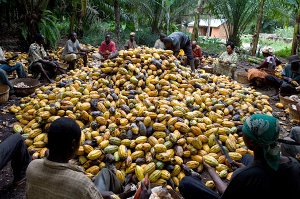A large scale farm spraying programme has begun to boost production, but some cocoa farmers are unhappy.
They had expected the spraying by Cocobod, which is in charge of production, to start at the beginning of August, particularly in the key cocoa producing district of Sefwi in Ghana's Western Region.
The free spraying of farms with insecticides and pesticides to increase the cocoa harvest was promised by President John Kuffour more than six months ago.
But a farmer who harvests about 50 tonnes of cocoa told the BBC on a recent trip to Sefwi: "Any spraying of cocoa that happens after August will not produce the desired result."
'Waste of time'
Ghana presently produces between 350,0000 to 400,000 tonnes of cocoa less than a third of what the current leading growing nation, Ivory Coast, produces.
Despite the dwindling fortunes of cocoa it still remains the county's foremost industry bringing in the almost $500m yearly.
According to Cocobod, mass spraying of cocoa was last undertaken in the 1960s when the country was the world's number one producer.
But some farmers are calling for the re-scheduling of the programme to next year.
"It will be a complete waste of resources if the spraying is done. It should be postponed to next year," another farmer said.
Deaf ears
They also want to do the spraying themselves complaining the government workers are too slow.
But their pleas have fallen on deaf ears.
"All the inputs like the spraying machines, gloves, nose-covers, pre-mix fuel and wellington boots are in place," the Co-ordinator of the project in Sefwi said, adding that people have already been trained to carrying out the exercise.
He added: "The farmers concerns are fine but spraying will go on as planned. Government think some spraying will be better than no spraying at all."
The delay to the spraying was apparently caused by hold ups in obtaining foreign exchange.
Glory days
President Kuffour's government has said they wanted to bring cocoa production to its post independence glory days.
They have committed themselves to increase the price of cocoa from about $35 per bag to about $40.
Another measure being considered in this cocoa revival is the local production of sacks.
Mr Kwame Sarpong chief executive of Cocobod said in Kumasi, Ghana's second city, that at the moment sacks are being imported from Bangladesh and India.
"This is not the best arrangement. We need to give jobs to our people," he added.
Ghana's jute factory is located in Kumasi. It was opened in the 1960s but ageing equipment and management problems has stunted its operations.
Gleeful wait
Whilst the spraying of farms gets underway farmers and buyers of Ghana's cocoa are set for the 2001/2002 main crop purchasing season.
Though the season has yet to be announced farmers hare ready for market.
"I have a lot of beans on the drying mats. I'm eagerly awaiting for Cocobod to announce the date for the purchases," a farmer said.
And if the spraying leads to a bumper harvest, as the government envisages next August, it will not be just this farmer who would be rubbing his hands with glee.
General News of Tuesday, 16 October 2001
Source: BBC Online
Ghana sprays for bumper cocoa crop













